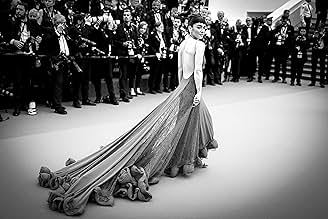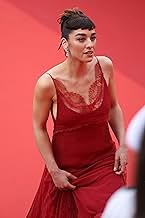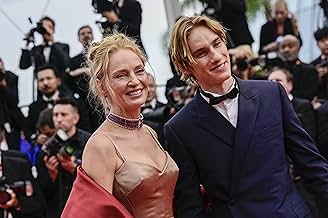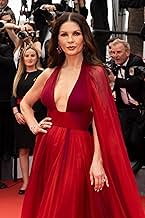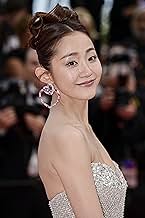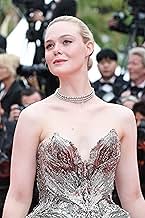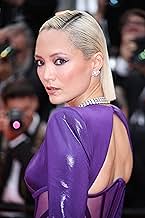ÉVALUATION IMDb
6,7/10
15 k
MA NOTE
La vie de Jeanne Bécu qui est née fille illégitime d'une couturière démunie en 1743 et qui a gravi les échelons de la cour de Louis XV pour devenir sa dernière maîtresse officielle.La vie de Jeanne Bécu qui est née fille illégitime d'une couturière démunie en 1743 et qui a gravi les échelons de la cour de Louis XV pour devenir sa dernière maîtresse officielle.La vie de Jeanne Bécu qui est née fille illégitime d'une couturière démunie en 1743 et qui a gravi les échelons de la cour de Louis XV pour devenir sa dernière maîtresse officielle.
- Prix
- 3 nominations au total
Stanislas Stanic
- Narrator
- (voice)
Patrick d'Assumçao
- Choiseul
- (as Patrick D'Assumçao)
Avis en vedette
Have always enjoyed movies about this fascinating time period, and never get too anal about historical accuracy. What's most important for me, as a movie buff is that the creators get the "heart" and the "atmosphere" of it across with the tools available. (Actors, camera,music,setting,costumes, dialogue and a solid story)
The positives for me: There were some gorgeous costumes, hair, make up and settings which all seemed to be historically correct and if they weren't it didn't matter. The score was ok. Nothing of it stood out neither exceptional or terrible. The subtitles, often, were not clear in translation and that may of knocked my enjoyment of the movie somewhat. ( I watch subtitled movies frequently, and this is NOT usually a big issue)
Seems like a fascinating story with some full characters but the story did not hit me as emotionally hard as I would of liked. It just didn't feel intimate enough for me.
There was some solid acting, but again, it was a story that didn't flesh out the characters enough for my tastes.
It was ok.
There was some solid acting, but again, it was a story that didn't flesh out the characters enough for my tastes.
It was ok.
This movie has great visual beauty: costumes and settings are breathtaking and the cinematography is impressive. But I did have some mixed feelings when leaving the theater. This was partly due to the writing, that felt at times a bit lazy, with superficial dialogues and some abrupt jumps in time, that they tried to overcome by a voice-over filling-in several chronologic blanks (talk about lazy!).
Johnny Depp is convincing as Louis XV, his somewhat mumbling and understated way of acting suits the character fine and his French diction is impeccable. The king's mischievous sisters are at many times hilarious, and I was impressed by Benjamin Lavernhe as the king's trusted valet, his part is one of the few more multilayered ones, and he moved me to tears when at the end he had to say goodbye to his dying master. But the parts of Jeanne's beloved stepson Adolphe, as well as that of Louis's beloved third daughter, stay way too sketchy (both having hardly one line to speak) to make the supposedly enormous impact that their loss had on Jeanne and Louis relatable.
My biggest problem however was Maïwenn. She is also the director and one of the writers, and apparently couldn't resist the challenge of also taking on the major and pivotal part of Jeanne. Jeanne DuBarry was 24 years old when she, as a young and ravishing beauty, caught the eye of King Louis. Well, Maïwenn can hardly be called a beauty; besides, she was already past 45 at the time of shooting, and clearly looked her age. In her sumptuous costumes she may make a royal impression, but it's hard to swallow that the king specifically chose her out of that endless line of much more attractive and younger women.
In short: not really bad, with great visual beauty (and by the way an equally impressive score!), but unfortunately neither really good.
Johnny Depp is convincing as Louis XV, his somewhat mumbling and understated way of acting suits the character fine and his French diction is impeccable. The king's mischievous sisters are at many times hilarious, and I was impressed by Benjamin Lavernhe as the king's trusted valet, his part is one of the few more multilayered ones, and he moved me to tears when at the end he had to say goodbye to his dying master. But the parts of Jeanne's beloved stepson Adolphe, as well as that of Louis's beloved third daughter, stay way too sketchy (both having hardly one line to speak) to make the supposedly enormous impact that their loss had on Jeanne and Louis relatable.
My biggest problem however was Maïwenn. She is also the director and one of the writers, and apparently couldn't resist the challenge of also taking on the major and pivotal part of Jeanne. Jeanne DuBarry was 24 years old when she, as a young and ravishing beauty, caught the eye of King Louis. Well, Maïwenn can hardly be called a beauty; besides, she was already past 45 at the time of shooting, and clearly looked her age. In her sumptuous costumes she may make a royal impression, but it's hard to swallow that the king specifically chose her out of that endless line of much more attractive and younger women.
In short: not really bad, with great visual beauty (and by the way an equally impressive score!), but unfortunately neither really good.
The main kick to see it is represented, no doubts, by Johnny Depp. Who, indeed, is a magnificent Louis XV. But the authentic gift is Pierre Richard in a surprising skin of duke of Richelieu or beautiful portraits of Dauphin and Marie Antoinette. , near the inspired portrait of La Borde proposed by Benjamin Lavernhe. A beautiful film for what you expect to define the beauty in a film about XVIII century. But little more that.
It is a film about seduction and loneliness and pleasure and compromises, lost and rivalry, rejection and life as circle but, in same measure, a fine - precise definition, subtle and some eccentric, of life.
Charming and provocative, not only for music, costumes or atmosphere but for fair reflection of fundamental truths.
In short, just delightful and a great Johnny Depp work.
It is a film about seduction and loneliness and pleasure and compromises, lost and rivalry, rejection and life as circle but, in same measure, a fine - precise definition, subtle and some eccentric, of life.
Charming and provocative, not only for music, costumes or atmosphere but for fair reflection of fundamental truths.
In short, just delightful and a great Johnny Depp work.
Jeanne du Barry plunges into the opulent world of 18th-century Versailles, following the remarkable rise of Jeanne Bécu (played by director Maïwenn herself), a woman born into poverty who claws her way up the social ladder to become the last mistress of King Louis XV (Johnny Depp). The film chronicles their unconventional romance amidst the whispers and machinations of a jealous court.
While Jeanne du Barry boasts undeniable strengths, it ultimately settles for a comfortable mediocrity. Maïwenn's portrayal of Jeanne is the film's heart and soul. She imbues the character with a sharp wit and a fierce determination to survive, causing you to admire her improbable journey. However, Depp's Louis XV feels muted. Trapped under layers of powdered wigs and regal attire, his performance lacks the spark needed to truly capture the complexity of a king burdened by ennui.
The historical context, though not deeply explored, provides a fascinating backdrop. We see glimpses of a society teetering on the brink of revolution, where the extravagance of the court clashes with the growing discontent of the people. This juxtaposition adds a touch of weight to the narrative, but the film doesn't fully explore the social commentary it seems to hint at.
Visually, the film is a treat. The production design meticulously recreates the opulent halls of Versailles, with rich fabrics, gilded furniture, and sparkling chandeliers transporting you to another era. The costumes are equally impressive, a dazzling array of silks and satins that bring the characters to life. The camerawork is steady, but doesn't take many risks, relying on traditional shot compositions.
The score is a pleasant mix of classical and orchestral pieces that complement the on-screen action without being overly dramatic. The editing is efficient, ensuring a smooth and brisk pace. The dialogue, however, can be uneven at times. While some scenes crackle with witty repartee, others fall flat, relying on exposition rather than letting the visuals do the talking.
Jeanne du Barry reminded me, in some ways, of Sofia Coppola's Marie Antoinette. Both films explore the lives of women who, despite their positions of privilege, are ultimately trapped by societal expectations. However, Marie Antoinette leans into a dreamlike aesthetic and a more melancholic tone, whereas Jeanne du Barry strives for a more grounded historical drama.
Overall, Jeanne du Barry is a visually stunning and entertaining movie that benefits from Mawenn's captivating performance. However, a shallow exploration of its themes and a somewhat underwhelming lead performance from Depp hold it back from greatness. If you're looking for a lavish historical romance with a strong female lead, this is worth watching. But for those seeking a deeper exploration of the characters and their place in history, you may leave with a desire for more.
While Jeanne du Barry boasts undeniable strengths, it ultimately settles for a comfortable mediocrity. Maïwenn's portrayal of Jeanne is the film's heart and soul. She imbues the character with a sharp wit and a fierce determination to survive, causing you to admire her improbable journey. However, Depp's Louis XV feels muted. Trapped under layers of powdered wigs and regal attire, his performance lacks the spark needed to truly capture the complexity of a king burdened by ennui.
The historical context, though not deeply explored, provides a fascinating backdrop. We see glimpses of a society teetering on the brink of revolution, where the extravagance of the court clashes with the growing discontent of the people. This juxtaposition adds a touch of weight to the narrative, but the film doesn't fully explore the social commentary it seems to hint at.
Visually, the film is a treat. The production design meticulously recreates the opulent halls of Versailles, with rich fabrics, gilded furniture, and sparkling chandeliers transporting you to another era. The costumes are equally impressive, a dazzling array of silks and satins that bring the characters to life. The camerawork is steady, but doesn't take many risks, relying on traditional shot compositions.
The score is a pleasant mix of classical and orchestral pieces that complement the on-screen action without being overly dramatic. The editing is efficient, ensuring a smooth and brisk pace. The dialogue, however, can be uneven at times. While some scenes crackle with witty repartee, others fall flat, relying on exposition rather than letting the visuals do the talking.
Jeanne du Barry reminded me, in some ways, of Sofia Coppola's Marie Antoinette. Both films explore the lives of women who, despite their positions of privilege, are ultimately trapped by societal expectations. However, Marie Antoinette leans into a dreamlike aesthetic and a more melancholic tone, whereas Jeanne du Barry strives for a more grounded historical drama.
Overall, Jeanne du Barry is a visually stunning and entertaining movie that benefits from Mawenn's captivating performance. However, a shallow exploration of its themes and a somewhat underwhelming lead performance from Depp hold it back from greatness. If you're looking for a lavish historical romance with a strong female lead, this is worth watching. But for those seeking a deeper exploration of the characters and their place in history, you may leave with a desire for more.
I really enjoyed this film! The scenery and the costuming, and the love story set in the time period of Louis XV! Johnny Depp is a master at using his eyes, expression and body language to create a feel in the room where each scene happens. Maiwenn did an excellent portrayal of Jeanne, and you could really feel the chemistry between them. In one scene, the king comes in and totally dominates the room communicating such feeling without words. I highly recommend this film. It was easy to keep up with the French dialogue using the subtitles. The music also carries you away,! I highly recommend this film. You Will feel so many emotions!
Le saviez-vous
- AnecdotesIt was partly shot in the Château de Versailles (i.e. the actual setting of the story), but the constraints were quite limiting: the filmmakers could only shoot on Mondays (where the castle is closed to the public), and only outside, in the Royal Chapel, in the Hall of Mirrors and the Hercules Salon, and no candles could be used as it could damage the location. As a result, several rooms were built as movie sets in a studio, as it was way easier to light and shoot scenes that way, without the time constraints.
Meilleurs choix
Connectez-vous pour évaluer et surveiller les recommandations personnalisées
- How long is Jeanne du Barry?Propulsé par Alexa
Détails
- Date de sortie
- Pays d’origine
- Site officiel
- Langues
- Aussi connu sous le nom de
- Jeanne Du Barry
- Lieux de tournage
- Versailles, Yvelines, France(palace, on location)
- sociétés de production
- Consultez plus de crédits d'entreprise sur IMDbPro
Box-office
- Budget
- 22 400 000 $ US (estimation)
- Brut – à l'échelle mondiale
- 14 938 195 $ US
- Durée1 heure 57 minutes
- Couleur
- Mixage
- Rapport de forme
- 1.85 : 1
Contribuer à cette page
Suggérer une modification ou ajouter du contenu manquant

Lacune principale
By what name was Jeanne du Barry (2023) officially released in India in Hindi?
Répondre

![Bande-annonce [OV]](https://m.media-amazon.com/images/M/MV5BNGI1MTkyNGYtNTBmOS00Njg5LTlmMjEtNjY2YzI5OWU2NWFmXkEyXkFqcGdeQXRyYW5zY29kZS13b3JrZmxvdw@@._V1_QL75_UX500_CR0)




